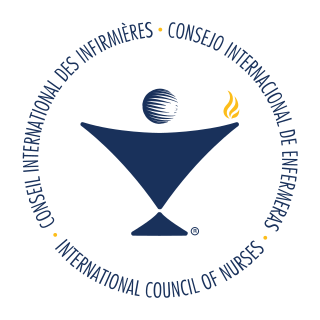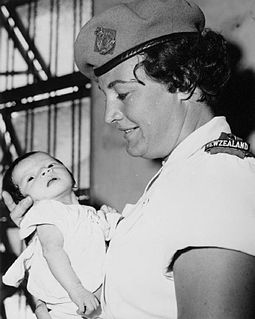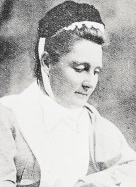Related Research Articles

A registered nurse (RN) is a nurse who has graduated from a nursing program and met the requirements outlined by a country, state, province or similar government-authorized licensing body to obtain a nursing license. An RN's scope of practice is determined by legislation, and is regulated by a professional body or council.

Dame Annette Faye King is a former New Zealand politician. She served as Deputy Leader of the New Zealand Labour Party and Deputy Leader of the Opposition from 2008 to 2011, and from 2014 until 1 March 2017. She was a Cabinet Minister in the Fifth Labour Government of New Zealand, and was the MP for the Rongotai electorate in Wellington from 1996 to 2017.
The American Nurses Association (ANA) is a 501(c)(6) professional organization to advance and protect the profession of nursing. It started in 1896 as the Nurses Associated Alumnae and was renamed the American Nurses Association in 1911. It is based in Silver Spring, Maryland and Ernest Grant, PhD, RN, FAAN is the current president.

The International Council of Nurses (ICN) is a federation of more than 130 national nurses associations. It was founded in 1899 and was the first international organization for health care professionals. It is headquartered in Geneva, Switzerland.
District Nurses work in the United Kingdom's National Health Service, managing care within the community and lead teams of community nurses and support workers. The role requires registered nurses to take a NMC approved specialist practitioner course. Duties generally include visiting house-bound patients and providing advice and care such as palliative care, wound management, catheter and continence care and medication support. Their work involves both follow-up care for recently discharged hospital inpatients and longer term care for chronically ill patients who may be referred by many other services, as well as working collaboratively with general practitioners in preventing unnecessary or avoidable hospital admissions.
The New Zealand Nurses Organisation (NZNO) is New Zealand's largest trade union and professional organisation that represents the nursing profession, midwives and caregivers.

The Indian Nursing Council is a national regulatory body for nurses and nurse education in India. It is an autonomous body under the Government of India, Ministry of Health & Family Welfare, constituted by the Central Government under section 3(1) of the Indian Nursing Council Act, 1947 of Indian parliament. Since 1947 Indian Nursing Council Act has undergone minimal amendments. This resulted in several anomalies that have impacted the morale of Registered Nurses in India especially those practicing in the private sector. The last amendment of the act was in the year 2006. According to the original act the function of the council is to provide "uniformity in nursing education".

Nursing is a profession within the health care sector focused on the care of individuals, families, and communities so they may attain, maintain, or recover optimal health and quality of life. Nurses may be differentiated from other health care providers by their approach to patient care, training, and scope of practice. Nurses practice in many specialties with differing levels of prescription authority. Nurses comprise the largest component of most healthcare environments; but there is evidence of international shortages of qualified nurses. Many nurses provide care within the ordering scope of physicians, and this traditional role has shaped the public image of nurses as care providers. Nurse practitioners are however permitted by most jurisdictions to practice independently in a variety of settings. Since the postwar period, nurse education has undergone a process of diversification towards advanced and specialized credentials, and many of the traditional regulations and provider roles are changing.

Dame Margaret Clara Bazley is a New Zealand public servant. She began her career as a psychiatric nurse and rose through the ranks to senior leadership positions at psychiatric hospitals and district health boards. In 1978 she became the Director of Nursing at the Department of Health, the chief nursing position in New Zealand and at that time the most senior position in the public service held by a woman, and in 1984 became the first female State Services Commissioner. She subsequently held top positions at the Department of Transport and the Department of Social Welfare.

At the Eighth International Conference of Red Cross Societies in London in 1907, the assembled delegates decided to create a commemorative International Nightingale Medal to be awarded to those distinguished in the nursing field. Subsequently, the Florence Nightingale Medal was instituted in 1912 by the International Committee of the Red Cross. It is the highest international distinction a nurse can achieve and is awarded to nurses or nursing aides for "exceptional courage and devotion to the wounded, sick or disabled or to civilian victims of a conflict or disaster" or "exemplary services or a creative and pioneering spirit in the areas of public health or nursing education". The Florence Nightingale Medal Commission comprises several members and staff of the ICRC, several of whom are nursing professionals, and the head nurse of the International Federation of Red Cross and Red Crescent Societies. A representative of the International Council of Nurses also participates in the work of the Commission.

The Royal New Zealand Nursing Corps (RNZNC) is a corps of the New Zealand Army. The corps was initially formed in 1915 from civilian nurses who volunteered for service during World War I, and who were granted honorary officer ranks. A Nursing Reserve had been formed as part of the New Zealand Medical Corps on 14 May 1908. Today, the corps is an officer-only corps that consists of commissioned officers who are employed for their specialist skills and knowledge as registered nurses, the corps works in conjunction with the Royal New Zealand Army Medical Corps and the Royal New Zealand Dental Corps to promote "health and disease prevention" and to provide "care for the wounded and sick". Nursing Officers in the New Zealand Army can be employed broadly in primary health, perioperative, surgical or emergency settings, which can see RNZNC personnel providing health services in a garrison health centre, in a civilian practice, or deployed on operations.

Sibylla Emily Maude, known as Nurse Maude, was the founder of district nursing in New Zealand. She was loved for her selfless work for the poor, walking many miles each day in every kind of weather to treat those who could afford no medical help.
The timeline of nursing history in Australia and New Zealand stretches from the 19th century to the present.
The history of nursing in the United Kingdom relates to the development of the profession since the 1850s. The history of nursing itself dates back to ancient history, when the sick were cared for in temples and places of worship. In the early Christian era, nursing in the United Kingdom was undertaken by certain women in the Christian Church, their services being extended to patients in their homes. These women had no real training by today's standards, but experience taught them valuable skills, especially in the use of herbs and folk drugs, and some gained fame as the physicians of their era. Remnants of the religious nature of nurses remains in Britain today, especially with the retention of the job title "Sister" for a senior female nurse.
The New Zealand Veterinary Nursing Association (NZVNA) is the representative body for veterinary nurses in New Zealand. Its purpose is to promote high standards of veterinary nursing in New Zealand.

Emma Ann Reynolds (1862-1917) was an African-American teacher, who had a desire to address the health needs of her community. Refused entrance to nurses training schools because of racism, she influenced the creation of Provident Hospital in Chicago and was one of its first four nursing graduates. Continuing her education, Reynolds became a medical doctor serving at posts in Texas, Louisiana and Washington, D.C. before permanently settling in Ohio and completing her practice there.

Annette Diana Huntington is a New Zealand nursing academic. She is a professor of nursing and head of school at Massey University and previously served as chair of the Nursing Council of New Zealand.
Denise Lucy Wilson is a New Zealand health academic. She is Māori, of Ngāti Tahinga descent, and is currently a full professor of Māori health at the Auckland University of Technology. She is a Fellow of the Royal Society Te Apārangi.

Annette Kennedy is an Irish nurse and President of the International Council of Nurses.
References
- ↑ NCNZ website, Retrieved 12 December 2017
- ↑ "Q & A WITH PROFESSOR ANNETTE HUNTINGTON". Archive.nursingreview.co.nz. June 2016. Vol. 16 (3). Retrieved 2017-12-12.